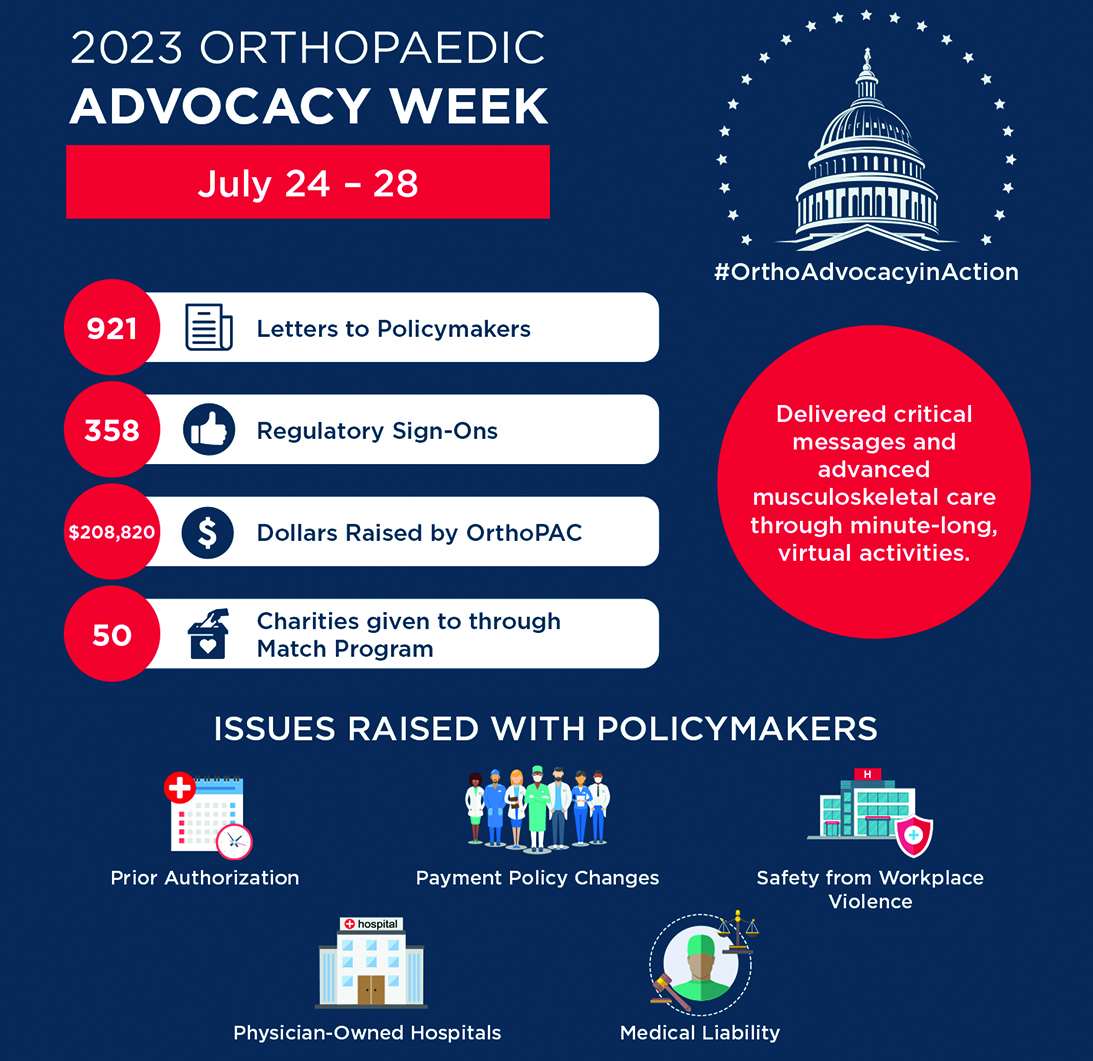
The third annual Orthopaedic Advocacy Week (OAW) took place July 24 to 28, 2023, and gave all AAOS members based in the United States the opportunity to help amplify year-round advocacy efforts to advance musculoskeletal care. Through simple, virtual activities, including sending prewritten letters to policymakers and sharing graphics on social media, members advocated for several high-priority healthcare policy issues from the 2023 Unified Advocacy Agenda. The agenda included protecting healthcare professionals against assault and intimidation, removing barriers to timely access to care, implementing lasting changes to Medicare physician payment, repealing the moratorium on physician-led hospitals, and safeguarding healthcare when it is needed most.
OAW participation results
Each day, AAOS members were asked via email to participate in a different short activity organized by the Office of Government Relations (OGR). A look at the metrics collected during this year’s OAW event paints a clear picture of the collective success of individual surgeon advocacy.
On day 1, AAOS members set the tone for the rest of the week and captured the attention of lawmakers by amplifying the orthopaedic community’s voice on social media using AAOS-branded graphics, sample social media posts, and the #OrthoAdvocacyinAction hashtag. On day 2, the momentum continued with 921 letters sent to congressional offices from the AAOS Advocacy Action Center, more than in any previous year.
On day 3, event participants had the opportunity to shape policy through rulemaking. A total of 358 people added their names to the AAOS-led regulatory letter about prior authorization and payment reform.
On the final day, AAOS members coalesced around the Political Action Committee of the American Association of Orthopaedic Surgeons (OrthoPAC) to raise $208,820 from 478 contributors during the OrthoPAC “Day of Giving.” On the Day of Giving, members had the opportunity to give back not only to their profession through the OrthoPAC but also to the charitable cause of their choice. OrthoPAC offered a charity match, allowing members to double the impact of their contributions and matching to more than 50 501(c)(3) organizations, including:
- Orthopaedic Research and Education Foundation
- Resurgens Charitable Foundation
- J. Robert Gladden Society
- Orthopedic Institute Foundation
- Orthopaedic Trauma Association
To date, OrthoPAC has raised $1.7 million toward its goal of $2 million for the year.
Prior authorization reform
In the months since the OAW, the impacts of these advocacy efforts are already starting to be seen. The movement to reform the excessive and burdensome prior authorization system has continued to gain momentum on Capitol Hill. Two committees recently discussed the Improving Seniors’ Timely Access to Care Act of 2023, which contains many of the reforms that AAOS’ regulatory letter called for.
During the OAW, hundreds of AAOS members raised awareness of this issue by signing onto the AAOS regulatory letter, and the following day, Congress introduced additional prior authorization relief in the form of the Getting Over Lengthy Delays in Care as Required by Doctors (GOLD CARD) Act of 2023 (H.R. 4968), which would exempt physicians from going through the prior authorization process in the Medicare Advantage program if more than 90 percent of their prior authorization requests were approved in the previous year.
Payment policy changes
The Strengthening Medicare for Patients and Providers Act (H.R. 2474)—which would tie Medicare reimbursement to the Medical Economic Index—has received 22 additional cosponsors in the U.S. House of Representatives since the nationwide grassroots efforts launched during the OAW. The issue of Medicare Payment Reform has also been a hot topic on Capitol Hill, with multiple committee hearings this year on the Medicare Access and CHIP Reauthorization Act and payment reform.
Although challenges in the House of Representatives leadership and negotiations over government funding have presented difficulties, there is growing bipartisan consensus that Congress needs to act to provide more stability to physician payments. Ongoing discussion about the failure to enact meaningful physician payment reforms and stability under Medicare ultimately spurred House Republican leaders to unveil draft legislation tackling systemic budget neutrality issues under Medicare Part B. Budget neutrality requirements mandate that any increased valuations for physician services get directly offset by cuts elsewhere—perpetuating an unsustainable, zero-sum dynamic that stymies accurate valuation. This new proposal would raise current budget neutrality thresholds to enable targeted reimbursement enhancements without forced cuts, while also exploring avenues to incorporate actual real-world data on utilization and expenses into the complex annual adjustment calculus. Although legislation remains in flux, the release of detailed reform concepts represents an incremental step toward remedying methodology flaws that threaten Medicare’s entire physician payment infrastructure.
Physician-owned hospitals
The Patient Access to Higher Quality Health Care Act of 2023 (H.R. 977), which would lift the current ban on physician-led hospitals, has gained seven cosponsors since the OAW, and the OGR is continuing to have productive conversations with more members of Congress to build additional support for the bill. Allowing physicians to have ownership in hospitals allows for high-quality care that meets a growing demand for healthcare services, especially in rural areas. The current prohibition penalizes patients who deserve the right to receive care at the hospital of their choice. The House Committee on Energy and Commerce also recently considered legislation that would grant exemptions allowing physician-owned hospitals to expand patients’ access to care in rural communities.
Appreciation and gratitude
The OGR would like to thank all its staff and volunteer leaders and, most importantly, the hundreds of orthopaedic surgeons across the country who participated for making this year’s OAW such a success. While AAOS and the OGR look forward to reaching new heights in the next OAW, our advocacy efforts continue year-round.
Learn more about the OAW online at aaos.org/orthopaedicadvocacyweek, and visit the Advocacy Action Center at aaos.org/advocacyactioncenter to continue to make the voices of the orthopaedic community heard throughout the year.
Brian Doty is senior government relations manager for the AAOS OGR.